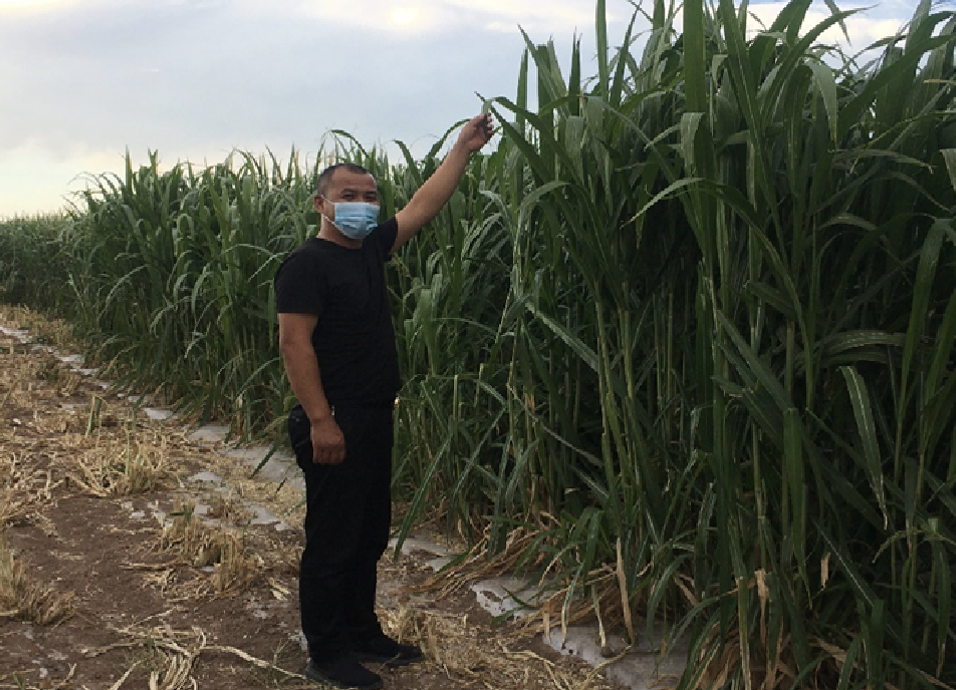
A smallholder stands next to his giant Juncao field in Muye Village, Yushugou Town, Urumqi, Xinjiang Uygur Autonomous Region. (Photo by WFP China COE)
Literally translating to “giant mushroom grass” and saline-alkali tolerant, giant Juncao can serve as a substrate on which to grow fungi, a green barrier that can control soil erosion and stem desertification, and high-quality fodder among other functions. It requires about the same amount of water as corn but can easily grow to be three meters high and produce much higher yields. Juncao has become the preferred fodder for many of the farmers and herders in northwest China and other areas due to its desirability among livestock and high digestion and absorption rates, and other advantages associated with the plant, such as its almost no susceptibility to disease and pest damage and relative ease of cultivation, including a weeding requirement of only once per year, have led to it becoming a major cash crop.
Juncao is currently grown on large amounts of land in Changji, Urumqi, Xinjiang Uyghur Autonomous Region, and substantial harvests are being achieved. In recent years, Changji’s Yushugou Town has been promoting the formation of its Juncao industry and providing assistance to local farmers and herders in order to help them increase their incomes and become more prosperous.
At the beginning of 2019, Yushugou’s Party committee asked Fujian Agriculture and Forestry University (FAFU) to assist with the introduction of Juncao in the town. The school agreed with the proposal, and Yushugou’s Giant Juncao Farming Project was launched soon after. The town’s government also encouraged a local enterprise known as Xinjiang Yufeng Water Saving Co. Ltd. to get involved with the undertaking and create an experimental 1,000-mu Juncao plot, and it did so. General manager Tao Jianbo was impressed with the plant’s ability to be harvested multiple times a year and the high output that the field yielded, so he decided to buy more equipment and scale up.
“We planted Juncao on a total of 2,700 mu of land in 2020,” he explained. “It yields more than 4 tonnes of output and an estimated 2,000 yuan of economic benefits per mu per harvest.”
Tao also mentioned that Yufeng spent a total of 6 million yuan on two silage harvesters; two sets of all-in-one Juncao grinding, ensiling, and packing equipment; and six vacuum sealers for the undertaking.
Ma Guoxiong, a livestock farmer who lives in Yushugou’s Shuguang Village, had an inventory of more than 100 head of cattle and over 40 head of sheep in 2019. He started feeding them with vacuum-packed giant Juncao fodder that year and was impressed by the convenience and benefits that it yielded.
“Juncao forage is 50 yuan cheaper per tonne than silage corn,” Ma explained. I bought 300 tonnes in 2019, which reduced my expenses by 15,000 yuan for the year. It can be stored for a long time, and my livestock are particularly fond of it.”
Primarily engaged in crop cultivation and animal husbandry, Yushugou has taken the opportunity to gradually create a fodder processing industry centred around a 5,000-mu Juncao cultivation base that meets the demand for feed made from the crop in the surrounding area. The products that it produces are also sold to buyers in Xinjiang’s Aksu and Hotan Prefectures and other parts of China.
Giant Juncao cultivation has been vigorously promoted in Changji and throughout Xinjiang. The campaign has greatly improved the total output value per unit area of land of the people who have gotten involved and has thus boosted their incomes and helps ensure that there are sufficient fodder reserves for the overwintering of local livestock. The plant has also been used as substrate for the cultivation of mushrooms, agaric, and other edible fungi and for the greening of desertified areas.
Juncao cultivation is continuing to expand in Yushugou, which helps promote the development of its agricultural industry, boost incomes and strengthen villages’ collective economies, and improve the natural environment.
For more information, please contact WFP China COE (wfpcn.coe@wfp.org)
Category
Juncao Brightens Futures in Yushugou Town and Throughout Xinjiang
Contributor
Juncao Brightens Futures in Yushugou Town and Throughout Xinjiang
Country
Case Study

